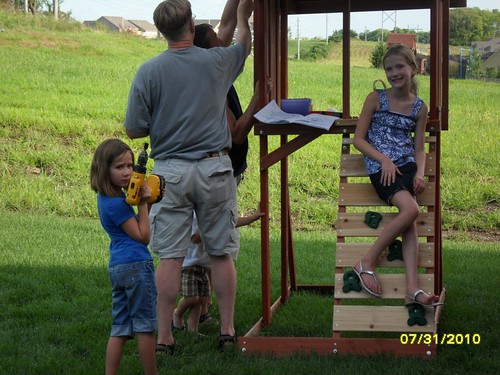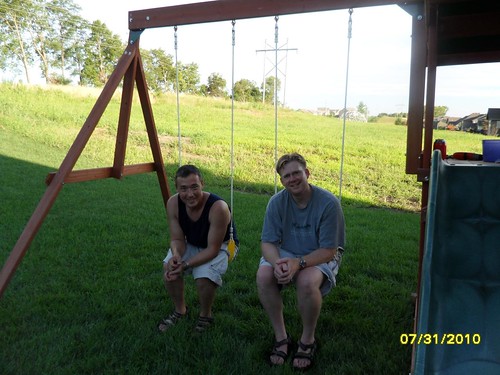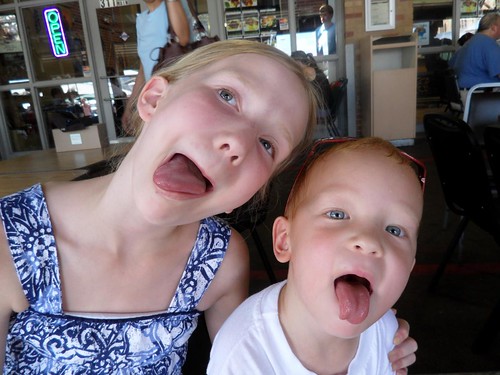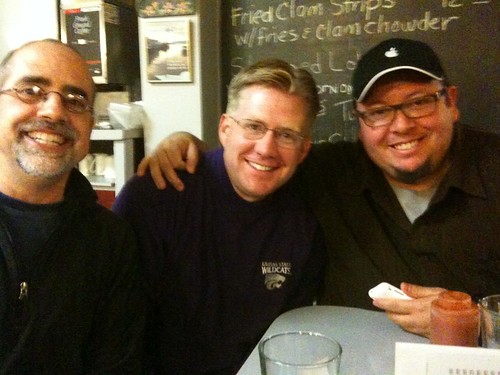Today I had a five and a half hour opportunity to put together a new swingset with my brother-in-law. This is the third time I’ve put together a swingset as a parent, and the first time I’ve put together a wooden swingset. The first time I ever spent hours putting together a swingset in my backyard for our children, I realized we could save MILLIONS of dollars in our country on standardized testing — Instead of having students take multiple choice exams, we could put them in groups and have them put together swingsets. If you can correctly follow the instructions for constructing a swingset, you probably have a handle on basic reading, basic skills for following instructions, passable dexterity skills with hand tools, as well as a proven capacity for patience to persevere and complete a fairly arduous task.
Today, I was CONSTANTLY thankful that my brother-in-law had both a cordless drill as well as a cordless screwdriver. I’d conservatively estimate the use of these tools easily saved us at LEAST an hour of time, compared to what we would have done with standard screwdrivers. In addition to saving us time, these tools also saved us quite a bit of sweat and muscle fatigue!
In Richard Halkett’s keynote for the 2010 Building Learning Communities conference, he discussed three categories we can use when considering potentially innovative technologies. These are:
- Technologies which do NOT help us improve our work (we should ignore and avoid these)
- Technologies which can help us INCREMENTALLY improve our work (we should adopt these quickly)
- Technologies which can TRANSFORM our work, fundamentally because they “change the script” of what we do and how we do it
The power drill and screwdriver today fit into the second category of Richard’s tools. They helped us incrementally speed up the process of constructing a swingset. Without their assistance, we would have built the same swingset but it would have taken MUCH more time and quite a bit more effort.
It’s easy to get overwhelmed by the number of web tools and websites available today which hold promise for improving learning. Just consider the websites listed in the education category of the website, All My Faves. Who can consider all these options and NOT be overwhelmed? I can’t!
When considering different web tools and digital strategies to use in your classroom, I encourage you to think of those which can be used TRANSFORMATIVELY. These are the tools and strategies which do not merely enhance what you’ve always done or been able to do in the classroom, but instead open up NEW doors of learning and possibilities which were not there previously. Perhaps, as Richard discussed at BLC, these tools and strategies can help you CHANGE THE SCRIPT for learning in your classroom. Instead of YOU, the teacher, being the source of knowledge at the front of the room – Embrace learning strategies and digital tools which empower your STUDENTS to become the teachers. By creating videos, podcasts, screencasts, interactive maps, and other knowledge products, you can “turn the instructional tables around” on your students.
Richard Halkett used fast food as an example of a transformative innovation which “changes the script.” In a typical sit-down restaurant, customers enter, sit down, order from a menu, eat, pay, and leave. Fast food restaurants change this script. Customers enter, order, sit down, eat, clean up, and leave. In addition to changing the script, transformative innovations can also create NEW ROLES for participants in an activity. Cleaning up after yourself is an example from fast food. I find Richard’s suggestion to “look for the innovations which change the script” to be very helpful in thinking about potentially transformative learning technologies and strategies.
I’m not suggesting the learning in our classrooms should resemble fast food. Quite the contrary – I agree with Sir Ken Robinson’s analysis in his book, “The Element: How Finding Your Passion Changes Everything,” when he says learning in our schools needs to resemble differentiated, gourmet restaurants much MORE than it should look like “fast food.”
Transformative learning experiences are often more memorable than “traditional lessons” precisely because they are different. We need to give up, as a society, the idea that schools everywhere should look alike. Great restaurants don’t all look alike, and neither should great schools. They don’t today, and we shouldn’t expect them to tomorrow.
Look for the innovations which change the script. Simply doing the same thing faster simply isn’t good enough.
Hat tip to the AMAZING educational stringer, Bob Sprankle, for podcasting Richard Halkett’s excellent BLC10 keynote and MANY more! Bob is, without a doubt, my July 2010 PD digital hero! Bob empowers me to learn “on the go” wherever I happen to be – and that’s CHANGING THE SCRIPT for PD!
Technorati Tags:
change, creativity, innovation, technology, tools, tool, blc10, cisco, drill, screwdriver, power
If you enjoyed this post and found it useful, subscribe to Wes’ free newsletter. Check out Wes’ video tutorial library, “Playing with Media.” Information about more ways to learn with Dr. Wesley Fryer are available on wesfryer.com/after.
On this day..
- Contrasting Video Messages: Goodnight iPad and Cheryl and Morgan: Learning Independence – 2013
- Professionally Mobilize Your WordPress Blog with PluginBuddy Mobile – 2012
- The Hobbit in Five Minutes [Video] – 2011
- A delicious facelift, skypecast drawbacks, and a new Flickr site – 2008
- Drupal versus Ning for Learning Community Websites – 2008
- links for 2008-07-31 – 2008
- Drupal dabbling begins – 2008
- Glimpsing the future of television – 2007
- Whitelisting websites – what a pain! – 2007
- Quick iTunes Backup – 2007





Comments
3 responses to “Look for innovations which change the script”
Wes, you’re too modest.
Standardized testing wastes billions of dollars each year.
I sure hope you’ll attend Constructing Modern Knowledge in the future – http://constructingmodernknowledge.com
Love what you have to say about changing the script. i think about myself in my small rural school and wonder if I am the only one seeking to change how things are done. I also wonder how much of an impact I can have. At times it seems like a losing battle to bring about the necessary changes. Your post is a big encouragement.
Hat tip right back at ya, my friend!
Bob